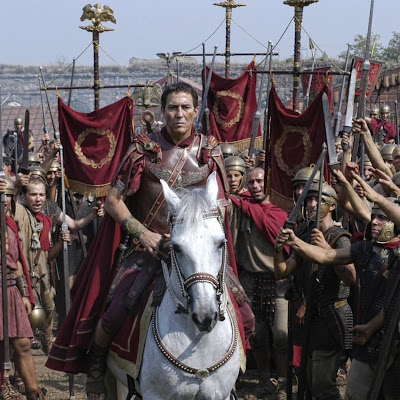 |
| Polly Walker as Attia of the Julii |
In the spring of 2003, a man with an Italian accent rang me in Paris.
“John Baxter,” he said without preamble, “your ass is mine.”
The caller – call him Guido Truffatore - was a Rome-based producer, and what claim, if any, he had on my ass was to concern me for the next two years.
He had a proposition, he said. Could I fly to Rome to discuss it?
Two days later, a taxi dropped me at the Parco dei Principi hotel next to the Borghese Gardens. As the bellboy opened the door to my room, a man further down the corridor regarded us narrowly.
The bellboy nodded towards him and the rooms beyond.
“Yasser Arafat.”
I realized then that the object dangling from the man’s wrist was not a purse but an Uzi.
That encounter and many that followed came back to me recently when I re-viewed the BBC’s Rome. In 2003, a series Guido wished to produce had been its main competitor for funding by HBO.
To hear Guido tell it, the whole thing began with The Sopranos. Someone suggested to HBO that America’s Italian community was displeased with constantly being depicted as criminals. They took the hint and invited proposals for a series that reflected well on Italy. Two found favour. One was Rome,the other, backed by a consortium that included Guido and actor Roy Scheider, was The Renaissance. Rome followed the career of Julius Caesar,The Renaissance the Medicis. For the latter, I created a narrative structure, episode breakdown, character summaries and anything else needed to get it to the screen.
Obviously Rome got the gig, but the series, planned for five seasons, was axed before the end of two because of dwindling audiences. Not long after, many of its sets at Cinecittà, the largest ever built, burned down. The tradition of TV series lavishly reconstructing an historical era burned with them.
Having tried to create a series on the same general lines makes me even more admiring of Bruno Heller’s writing on Rome. I never discovered whether he or John Milius, who shares credit for developing the series, conceived its key idea, of using two lowly figures in Caesar’s army to tell the story of his rise and fall, but Milius is known to admire Kurosawa’s Kakushi-torie no san-akuninaka The Hidden Fortress, which also included a couple of spear-carriers who become hapless spectators to a war.
 |
| Ray Stevenson and Kevin McKidd as Titus Pullo and Lucius Vorenus |
The involvement of Milius gives Rome an improbable family resemblance to the Star Wars saga. Lucius Vorenus and Titus Pullo, its R2D2 and C3PO, are the only common soldiers mentioned by name in Julius Caesar’s memoirs. Vorenus (Kevin McKidd) is the career centurion, a humourless sergeant, good at his job and mindful of his place – in contrast to Pullo (Ray Stevenson), an undisciplined grunt, inclined to get drunk and crack skulls, but a good man in a fight.
 |
| Ciaran Hinds as Julius Caesar. |
Around them swirls a cast straight from the history books, led by Caesar (Ciaran Hinds), a larger than life aristocrat, convinced he should be king of Rome but devious enough to have someone else suggest it, and his unscrupulous right hand man Mark Antony (James Purefoy), a charming lout Among the women, Polly Walker plays Atia, Antony’s voluptuous tart, while Caesar is in thrall to her arch enemy, the icy Servilia (Lindsay Duncan).
It would take another page to list the subsidiary characters but the real star is Rome. The detail is never less than absorbing, and overturns our vision of the ancient world as comprehensively as did Fellini’sSatyricon. There’s barely a white column to be seen. Facades and statues are painted as gaudily as circus posters. Instead of a portentous commentary or rolling prologue, Ian McNeice’s tubby town crier, chins quivering as he announces the day’s events to an uncaring Forum, keeps us updated while remaining in period.
 |
| Ian McNiece as the Forum news-reader |
Sanctified with the stamp of historical accuracy, Rome’s eye-opening sex and violence paved the way for Game of Thrones. As Mark Antony rolls off Attia at the end of a sweaty bout, she casually holds out her hand – and a servant, who’s been standing just out of shot, hands her a towel, while another gives Antony a cup of wine. Slaves were not simply taken for granted. They had as much human existence to their owners as a wardrobe.
 |
| James Purefoy as Mark Antony |
The women of Rome have a Hello! magazine credibility. Any of them might just have returned from cocktails with the Kardashians. One scene shows Attia preparing a gift for another friend whom she may shortly stab in the back. The “gift” is a short, balding slave with some of Stanley Tucci’s rueful diffidence, but (also like Tucci: who knows?) impressively well hung. When her daughter suggests the gesture might be in poor taste, Attia says “Nonsense. A big penis is always welcome” - wisdom surely fit to stand beside Tempus fugit and Carpe diem.
No comments:
Post a Comment
Note: only a member of this blog may post a comment.